- Home
- Andrew Wareham
Dire Shenanigans (The Making of a Man Series, Book 2) Page 22
Dire Shenanigans (The Making of a Man Series, Book 2) Read online
Page 22
Inevitably they discussed the works of Mr Charles Dickens, agreeing them to be of remarkable stature, but just occasionally partaking of the vulgar melodrama, and there was the problem of the contrived names that the gentleman so insisted upon. No doubt they were funny in their way, but it could be a clumsy, contrived, schoolboyishly jokey sort of fashion. There was a pleasure in meeting a like mind, although Dick suspected that she might perhaps be taking pains to be complaisant - not to worry, she was showing a sufficiency of intelligence to make her company easily acceptable.
They parted outside a dress-shop - the selection of female apparel inappropriate for a single man, obviously - each smiling happily and Mr and Mrs Sudbury even more so.
No harm in making a point - Dick strode deliberately towards the portals of the nearby bank, let them hear the greetings as he entered. Not every client was treated with such enthusiasm.
He made his way back to Burkes in reflective mood. The agricultural life was perhaps the ideal of the English gentleman, but it lacked variety; there was a limit to the conversation one could make about the turnip crop as well. Not to put too fine a point upon the matter, he was bored, and, even worse, he was a public figure and cultivating respectability. There was any number of unattached young females to be found who were in no way respectable and would be very happy to relieve him of a little of his wealth in exchange for their favours and would give him something to do in his spare hours - but he could not possibly install one of them at Burkes. He must very soon take himself off, out of sight of his local contemporaries.
There was a letter awaiting his attention on the hall table, marked as from London.
Major Hewitt conveyed his regards to Major Burke and wished to inform him that he might be discovered at the barracks of the Rifle Brigade in Winchester on Tuesday next, should he be at leisure to meet him, possibly at about eleven of the clock. Civilian dress would be appropriate.
There could be no harm in discovering what was wanted of him. It could hardly be to return to the States and he had no experience elsewhere to offer and there was certainly nothing to interest the major and his people in this backwater. It was quite intriguing.
"Briggs, I discover I must be in Winchester for eleven on Tuesday. Find me the trains, if you please."
If he had a valet of his own he would not even have to make the request – the task would be performed for him. He must show willing.
“As well, Briggs, can you tell me how best to take on a valet? It seems that one is expected to retain the services of a gentleman’s gentleman, if one is to be recognised as a gentleman of the highest cut.”
“Three days, Sir Richard, possibly four. A young man who has newly promoted himself to the trade from the ranks of the indoor manservants will be the ideal. Better not from a local household – a letter to the Agency in London will be best. They are wholly reliable, I assure you, sir.”
The job-coach from Blandford pulled up behind Burkes exactly four days later and disclosed a very precise young man in a curly-brimmed low hat, the only thing for country wear. He begged audience of Briggs and produced his note from the Agency. Briggs welcomed him and placed a shilling in the driver’s hand, told him the journey was to be charged to Burkes’ account.
“My master is newly come to his title, Mr Plaistow. He is a young gentleman but has travelled much in America and may well return there on government business and requiring an absolute confidentiality. He is to wed fairly soon, I am sure. He will wear civilian dress more often than military attire but is to be fully equipped with both. I much doubt that he will be prepared to travel to London for the benefit of Savile Row tailoring and it will be necessary to make the best of the practitioners to be discovered in Dorchester and Manchester and Liverpool.”
Plaistow was somewhat daunted by the disclosure of the ramifications of his task; he was not sure that he could turn out a gentleman to his own satisfaction in the absence of a certain minimum of tailoring. The Agency would be displeased if he left his new master on first sight; he must at least remain his year.
Briggs introduced him to Dick and then to his wardrobe; he warned Dick that his man would certainly demand that he visited his tailor immediately.
“A man cannot do his job except he has the raw materials, Sir Richard. ‘Bricks without straw’, sir!”
“While he accepts that I am several different people, there will be no problem, Briggs. But he must allow for me to be Sir Richard here and Major Burke elsewhere and Businessman Burke in Liverpool – for I am all of those things.”
“I will speak to him, sir, and suggest that he will receive recompense that will reflect his efforts. Eighty-five pounds, Sir Richard, plus his own tailor’s bill, and his keep of course. Should he come to wed, then a respectable little place would be expected, sir. Valets do sometimes take a wife, but not invariably by any means; in my experience they are often not of the marrying kind.”
The statement was made blandly and Dick chose not to beg elucidation – he did not want to know just what Briggs was implying.
He journeyed to Winchester – crawling coach to Blandford; slow local train to Poole; fast mainline express to Winchester, each leg of the excursion taking about an hour. He walked the last few yards from the platform at Winchester to the front gates of the Peninsular Barracks, stopped before the sentry.
“Major Sir Richard Burke to meet Major Hewitt, soldier.”
The green-uniformed private soldier came to attention before doubling into the Guard Room. He came back in seconds with his sergeant.
“Sir! If you would accompany me, sir. Major Hewitt is expecting you, sir!”
Hewitt was sat in a comfortable office, tea pot on its tray beside him.
“Black with one sugar, Sir Richard! Thank you for coming, sir! I trust all is well with you in your new life?”
“I am inured to it, sir. I shall spend part of my year in rural seclusion, no doubt enjoying the song of the nightingale – what sort of noise does the bloody bird make, by the way?”
“Twitter, twitter, tweet, tweet, I believe, Sir Richard.”
“I presume you are of the urban sort, Major Hewitt.”
“The clatter of iron-shod wheels on cobblestones as the night-soil cart wends its way through the streets is more attractive to my Muse, Sir Richard.”
Dick laughed, then commented that he had enjoyed the outdoors in America, but he could not become fascinated by the cluttered fields of England.
“It is all hedgerows and gates and fences, sir – far too civilised. No man could call the great plains of America civilised, after all! I am for Liverpool in a very few weeks to breathe in some soot and coal dust and to consider what next I am to do.”
“I had hoped you might be bound for the River Mersey, Sir Richard. You may even come into sight of Wallasey, and Cammel Laird, the shipbuilder.”
“That is well possible, Major Hewitt. Is there a particular reason why I might do so?”
“You have heard of the Alabama, Sir Richard?”
“Confederate commerce raider, built in Liverpool as a merchant vessel, launched unarmed and sent overseas, to the Azores perhaps?”
“Quite right, sir. You neglected to mention that she was accompanied by another merchant ship that coincidentally happened to have two massive pivot guns and a broadside of naval thirty-two pounders in her hold. She took aboard a Southerner as captain – a Mr Semmes – and recruited the English crew to sail her on a privateering shares basis and then proceeded to take, burn or destroy the great bulk of the Northern whaling fleet before playing merry hell with commercial shipping throughout the whole of the Atlantic. The Union seems to believe that yards in Liverpool and Glasgow are building more raiders and ironclad warships for the South. They regard this with some dismay and see it as evidence of hostility to them.”
“Is it not a hostile act by our government, sir?”
“Good God, no. Simple profiteering by the builders, that is all!”
“I have heard it sugg
ested, Major Hewitt, that the American mercantile marine has been effectively driven off the Atlantic by these raiders.”
“Indirectly, certainly, Sir Richard. Fewer than ten percent of all of their ships have been taken, but almost none are able to sail now – much to the benefit of British trade, of course.”
“I am not sure that I follow you, sir.”
“If you wish to send a cargo across the seas, Sir Richard, then you will require a degree of certainty that it will not be lost.”
“To which end you will demand that the ship be insured as well as paying a premium yourself. Lloyds of London I believe carries the bulk of such risks. Oh! Of course! The premiums demanded!”
“Risen massively in past months, Sir Richard. If you can find an insurer at all then you will be paying anything up to six hundred on the thousand – prohibitive rates!”
“In American bottoms, obviously… in British, what is the rate?”
“Twenty pounds on the thousand.”
“Is any American sailing?”
Hewitt shook his head; the Atlantic was empty of the Union merchant flag.
“We thus desire this pleasant state of affairs to continue… But the public is, generally speaking, much opposed to the Southrons, sir, and one might think that many of our government might oppose slavery.”
“Quite right, Sir Richard. An interesting conundrum thus results, does it not?”
“The insurance companies and brokers at Lloyds must continue to believe that no American vessel can live on the Atlantic, and that more raiders will soon take the seas to destroy the China trade as well. The newspapers and the literate public must be given assurances that no succour will be given to the wicked South. Washington must come to understand that Britain has seen the error of its ways. Simultaneously!”
Hewitt laughed and continued his little speech.
“I amused myself at the Music Hall last week, Sir Richard. There was a conjuror who produced a white rabbit from a hat, which then showed to be empty; he then put the hat on his head at which point it was raised to disclose a black bunny, to the amazement of all. We must do one better than that – we have but the one coney and it must be simultaneously black and white depending on whether you sit in the Gods or the Stalls!”
“And we must draw it from an empty hat, I presume?”
“But of course!”
Dick sat back, sipping at his tea – it was rather sad, he reflected, but he actually liked the stuff, would much rather not take wine at this time of day. Perhaps he was getting old.
“To frighten the insurance people, Major Hewitt, then we must allow building of ships to continue. To placate the newspapers, the construction must be kept secret. To keep Washington quiet, the ships must not fall into Southern hands; except that some must, to keep the Confederates in Liverpool and Glasgow, because if they buy from French or Prussian yards we lose all control.”
“The Confederates are currently seeking to commission a large ironclad, similar to Warrior or the French La Gloire, and wish to purchase as well a smaller vessel carrying a pair of turrets, two ten or eleven inch rifles in each. Negotiations are well advanced and Richmond is believed to be about to despatch an amount of bullion to pay for them. The Confederate dollar is so devalued as to be worthless in international trade – they must use gold.”
That sounded an interesting prospect to Dick.
“My presence in Liverpool is accounted for by my business interests, Major Hewitt – but I will be called traitor by the Federal government if I am visibly involved on the Southron side.”
“I have it in mind for you to be wholly invisible, Sir Richard…”
They discussed Hewitt’s plan for an hour and decided that it was good.
Dick returned to Burkes to set the business in motion.
“I find I must attend at the firms in Liverpool, Briggs. I shall be away for three or four weeks initially, I expect. Thereafter, I may be called back at almost no notice at all. What must I do to inform my local acquaintance of my movements?”
“A morning call on the Sudburys would be appropriate, sir. Plaistow will attend to your needs in the North Country, of course – you must become used to his presence, sir. There is a house in Liverpool, I believe?”
“Sergeant Bill, that is Mr William Williams – I must become used to that name! He has in any case received instructions to purchase for me in the town itself and close to Mrs Boswell’s first location. I would expect him to have completed by now and to have staffed the place correctly.”
“Very good, sir. I believe him to be in possession of what amounts to a modest country seat – you do not need a second such; a small place – seven or eight bedrooms, that sort of thing – will do you well enough, sir. You may well not wish to take your family there, sir, unless, for example, you wish Lady Burke to attend at the opening of a charity hospital or the launching of a ship or some such event.”
Dick reminded himself that he had told the Sudburys that his own personal library was to be discovered in his Liverpool house; he must make that true. A visit to a few bookshops containing a second-hand department would suffice to add old and treasured volumes to the obviously new.
“Good. A morning call tomorrow, and another to the Meridews on Thursday, for they are great gossips and will tell the whole County of all my doings, and I may leave for Liverpool on, say, Monday next?”
“Excellent, sir. You will inform Plaistow this evening, of course, and he may send his letter to Mr Williams so that the house may be opened and ready for you.”
The Sudburys were interested to discover that Sir Richard must go to Liverpool and wondered when he might return.
“Three, possibly four weeks, Mr Sudbury. My people have informed me of a naval ship-building yard in search of an investor to allow them to grow to a size where they may construct the most modern of iron-clad, or even all-steel, line-of-battle ships. Armed with the newest of great guns as well, rifled and to fire explosive shells of some ten inches in the bore! Every ship in the Royal Navy must be armoured at very least within a very few years – the American experience tells us that.”
Sudbury was well enough informed that he could hear millions in Dick’s words – there would be a thousand and more of warships to be launched in the coming two or three decades. He said as much and was corrected.
“The smaller countries of the world – including every state in South America, for example – will wish to possess such ships, and will not have the yards and industry to provide for themselves. The Ottoman Empire will also have the cash to purchase from English yards and perhaps other, less obvious countries as well.”
The millions were multiplied by ten at least.
The aristocracy tended to sneer at the business world and to believe that gentlemen did not get their hands dirty; the County was far more pragmatic. Sudbury sent his butler to remind Miss Louise that they had a guest and kept Dick in conversation until she joined them.
“The days are drawing in, Miss Louise, and the winds becoming colder. Not the time I would choose to go north, but business has its demands. I shall be glad to return to the milder climes of Dorset.”
Naturally she asked when he expected that to be, seemed pleased that it would be only a very few weeks.
“Before full winter, for certain, ma’am. I shall look forward to seeing you then.”
She blushed a little and assured him he would be a very welcome visitor on his return.
“You will be in time for my daughter’s birthday celebration, Sir Richard – she will be a miss of eighteen in November.”
Dick smiled his congratulations, in advance of the day. He took his leave, walked with Sudbury to the door.
“I would hope to call on you immediately on my return, Mr Sudbury, when all of my affairs are settled as they should be. I must determine just what part of my assets must remain in America and how they are to be managed – I have some thousands of acres in the States of Kansas and Missouri which will become wheat farms w
hen the War is over, as well as my half share of one of the larger importing houses in Baltimore and Washington and lesser interests in a number of other concerns. But I would wish to acquaint you with these details when all is finalised.”
There could only be one reason why Dick should wish to discuss his financial status with Sudbury – the older man was delighted to encourage him to make his visit at soonest and trotted back to find his daughter as the front door closed.
“Well, my dear girl, you seem to have attracted a finer suitor than your sisters achieved!”
“Is he truly so, Papa? I had wondered if that was in his mind, I must confess, but there seems to be no great warmth to his look… Perhaps he feels constrained to offer little more than courtesy before making any declaration?”
“I believe that Sir Richard is seeking to establish his family, and has fixed upon a wife who will meet his needs. That being said, my dear, he appears to have chosen you for the position – and there are, what, a dozen of other misses of about your age in area and who he has met. I can think of five, at least, who will bring settlements with them far in excess of the little I can put in your hands – so he is motivated by other than financial reasons, that is for sure!”
She had not considered that point, having no knowledge at all of financial matters; she was much heartened by the fact.
“I will confess, Papa, that I would not dislike to be Lady Burke – there is much to be said for a title! And Sir Richard himself is an educated man as well as one who has made his mark in the world as a soldier and businessman. Could he not do far better for himself than a younger daughter of a Dorset squire?”
It was time to explain the realities of the world, Sudbury realised.
“Sir Richard is a baronet, a major and a rich businessman; he also has won a decoration for valour in the field that all must admire. He also, my dear, had a father.”

 A Killing Too Far
A Killing Too Far Killing's Reward
Killing's Reward A New Place
A New Place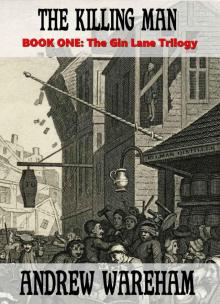 The Killing Man
The Killing Man Bold and Blooded
Bold and Blooded The Breaking Storm (Innocent No More Series, Book 2)
The Breaking Storm (Innocent No More Series, Book 2) Nobody’s Child
Nobody’s Child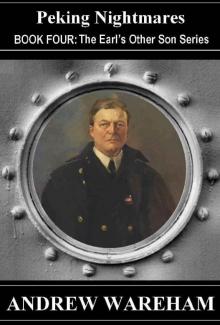 04 Peking Nightmares (The Earl’s Other Son Series, #4)
04 Peking Nightmares (The Earl’s Other Son Series, #4)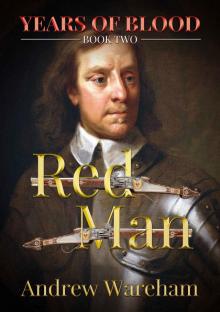 Red Man
Red Man Foreign Mud
Foreign Mud The Gathering Clouds (Innocent No More Series, Book 1)
The Gathering Clouds (Innocent No More Series, Book 1) 06 A Soldier’s Farewell (Man of Conflict #6)
06 A Soldier’s Farewell (Man of Conflict #6)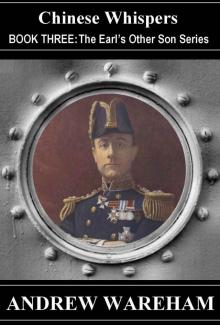 Chinese Whispers
Chinese Whispers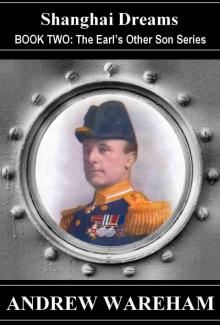 02 Shanghai Dreams (The Earl’s Other Son #2)
02 Shanghai Dreams (The Earl’s Other Son #2) Hungry Harry: An Orphan in the Ranks
Hungry Harry: An Orphan in the Ranks A Wretched Victory (Innocents At War Series, Book 6)
A Wretched Victory (Innocents At War Series, Book 6) Illusions Of Change (A Poor Man at the Gate Series Book 6)
Illusions Of Change (A Poor Man at the Gate Series Book 6) The Wages Of Virtue (A Poor Man at the Gate Series, Book 8)
The Wages Of Virtue (A Poor Man at the Gate Series, Book 8) Blood and Famine (Man of Conflict Series, Book 4)
Blood and Famine (Man of Conflict Series, Book 4) The Friendly Sea (The Duty and Destiny Series, Book 1)
The Friendly Sea (The Duty and Destiny Series, Book 1) Bursting Balloons (Innocents At War Series, Book 5)
Bursting Balloons (Innocents At War Series, Book 5) The Death of Hope
The Death of Hope Deadly Shores (The Duty and Destiny Series, Book 11)
Deadly Shores (The Duty and Destiny Series, Book 11) The Vice Of Virtue (A Poor Man At The Gate Series Book 10)
The Vice Of Virtue (A Poor Man At The Gate Series Book 10) Virtue’s Reward (A Poor Man at the Gate Series, Book 11)
Virtue’s Reward (A Poor Man at the Gate Series, Book 11) A Deadly Caper (Innocents At War Series, Book 2)
A Deadly Caper (Innocents At War Series, Book 2)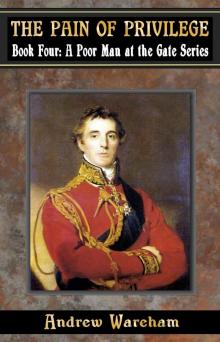 The Pain Of Privilege (A Poor Man at the Gate Series Book 4)
The Pain Of Privilege (A Poor Man at the Gate Series Book 4) Far Foreign (The Duty and Destiny Series, Book 9)
Far Foreign (The Duty and Destiny Series, Book 9)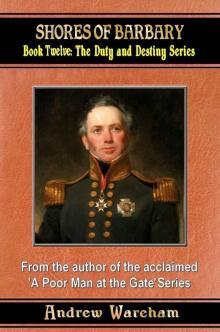 Shores of Barbary (The Duty and Destiny Series, Book 12)
Shores of Barbary (The Duty and Destiny Series, Book 12)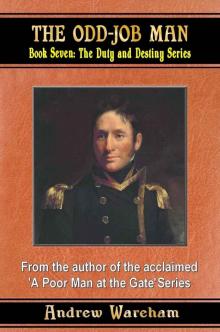 The Odd-Job Man (The Duty and Destiny Series, Book 7)
The Odd-Job Man (The Duty and Destiny Series, Book 7) Fire and Folly (Man of Conflict Series Book 3)
Fire and Folly (Man of Conflict Series Book 3) A Victorian Gent (The Making of a Man Series, Book 1)
A Victorian Gent (The Making of a Man Series, Book 1)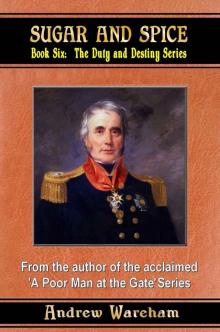 Sugar and Spice (The Duty and Destiny Series, Book 6)
Sugar and Spice (The Duty and Destiny Series, Book 6) Dark Days Of Summer (Innocents At War Series, Book 4)
Dark Days Of Summer (Innocents At War Series, Book 4) Dire Shenanigans (The Making of a Man Series, Book 2)
Dire Shenanigans (The Making of a Man Series, Book 2) The Fuzzy-Wuzzy Man (The Duty and Destiny Series, Book 3)
The Fuzzy-Wuzzy Man (The Duty and Destiny Series, Book 3) Privilege Preserved (A Poor Man at the Gate Series Book 5)
Privilege Preserved (A Poor Man at the Gate Series Book 5) No Longer A Game (Innocents At War Series, Book 3)
No Longer A Game (Innocents At War Series, Book 3)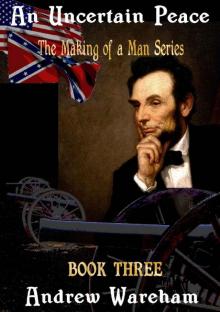 An Uncertain Peace (The Making of a Man Series, Book 3)
An Uncertain Peace (The Making of a Man Series, Book 3)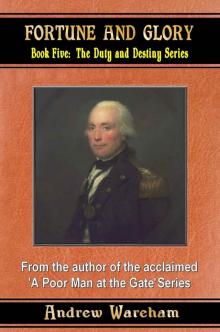 Fortune And Glory (The Duty and Destiny Series, Book 5)
Fortune And Glory (The Duty and Destiny Series, Book 5) The Old Order (A Poor Man at the Gate Series Book 7)
The Old Order (A Poor Man at the Gate Series Book 7) A Place Called Home (Cannibal Country Trilogy, Book 2)
A Place Called Home (Cannibal Country Trilogy, Book 2) Nouveau Riche (A Poor Man at the Gate Series, Book 2)
Nouveau Riche (A Poor Man at the Gate Series, Book 2) The Privateersman (A Poor Man at the Gate Series Book 1)
The Privateersman (A Poor Man at the Gate Series Book 1) Britannia’s Son (The Duty and Destiny Series, Book 4)
Britannia’s Son (The Duty and Destiny Series, Book 4) Long Way Place (Cannibal Country Trilogy, Book 1)
Long Way Place (Cannibal Country Trilogy, Book 1) Spanish Tricks (Man of Conflict Series, Book 5)
Spanish Tricks (Man of Conflict Series, Book 5) A Parade Of Virtue (A Poor Man At The Gate Series Book 9)
A Parade Of Virtue (A Poor Man At The Gate Series Book 9) A Busy Season (The Duty and Destiny Series, Book 8)
A Busy Season (The Duty and Destiny Series, Book 8) Billy Bacon and the Soldier Slaves (Colonial Warrior Series, Book 1)
Billy Bacon and the Soldier Slaves (Colonial Warrior Series, Book 1) Raging Rajahs (Man of Conflict Series, Book 2)
Raging Rajahs (Man of Conflict Series, Book 2)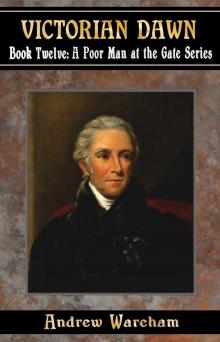 Victorian Dawn (A Poor Man at the Gate Series, Book 12)
Victorian Dawn (A Poor Man at the Gate Series, Book 12) Born To Privilege (A Poor Man at the Gate Series Book 3)
Born To Privilege (A Poor Man at the Gate Series Book 3) The Soldier Brat (Man of Conflict Series, Book 1)
The Soldier Brat (Man of Conflict Series, Book 1)